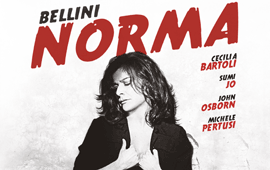> [Archived] Interviews

Radio Romania Music - questions for Mrs. Cecilia Bartoli
With this recording (and the stage production in Salzburg this year), we go back to the origins of the opera. Thanks to a new critical edition of the score by Riccardo Minasi and Maurizio Biondi we had the chance to open traditional cuts, reestablish the original tempi and tonalities and countless details in the orchestration. We perform on period instruments, which creates a totally new and transparent sound and makes evident that Bellini took a lot of care when he orchestrated his scores. We also try and recreate the vocal colours Bellini chose for his roles: Norma was written for Giuditta Pasta, whose repertoire included many roles considered mezzo-soprano parts today. Adalgisa was written for Giulia Grisi, who evidently had a light soprano - Bellini also wrote the role of Elvira in "I puritani" for her and Donizetti Norina in "Don Pasquale". Pollione finally was sung by Donzelli, a tenor whose repertoire included countless Rossini roles.
In the cast for the new "Norma" CD there is a Romanian name: Liliana Nikiteanu (written in Romanian Liliana Nichiteanu). Tell us about your collaboration with Liliana Nikiteanu. Do you know or did you collaborate with another Romanian artists?
Of course, I have worked with Liliana for many, many years, mainly in Zurich where we performed together in many operas by Mozart, but also Handel and Rossini - most recently in Rossini's "Otello" in Zurich and "Le comte Ory" in Vienna. She is a preferred partner of mine because we share the same musical goals, she is an intense and versatile actress and a reliable and dear colleague. And you can always count on her to venture into new grounds... I also remember performances conducted by Ion Marin, who by the way conducted my album "Rossini heroines", so this is also a collaboration that goes way back.
Every of your albums is very special, regarding repertoire, presention, etc. Where do you find inspiration for each album? Which is the path that you are walking to realise a new album?
Mainly curiosity - and by the way, taught by Nikolaus Harnoncourt! To never trust traditions but to always go back to the sources, to study the surroundings, the historical and cultural context - for instance: who were the people Mozart heard or studied with? So I discovered Haydn, Gluck, Salieri one by one. Or when I studied the life and times of Maria Malibran and realized that she - whose voice today would be considered a mezzosoprano - was one of the most famous Sonnambulas and Normas...! Which made me turn to Bellini...
Or the musical roots of Händel which recently made me discover the amazing music and personality of Agostino Steffani...
Which is the place of classical music in contemporary society? I think you are a champion of promoting classical music to ordinary people, without loosing the quality…
I think that in our times good music is more and more essential. It appeals to sides of the human personality which are too often neglected and which are vital to the development of the soul, ones feelings, one's well-being. There is never too little classical music and we must fight for its propagation. But if you want to reach and move people it is vital that it is of utmost quality and extremely well performed.
How would you describe yourself, as an artist and also, as a human being? Which are the things in which you believe?
I believe in the power of music, I love making music but I also love listening to music. I am curious and passionate. I love to be on stage but I try to lead a simple and normal life as far as it is possible.














